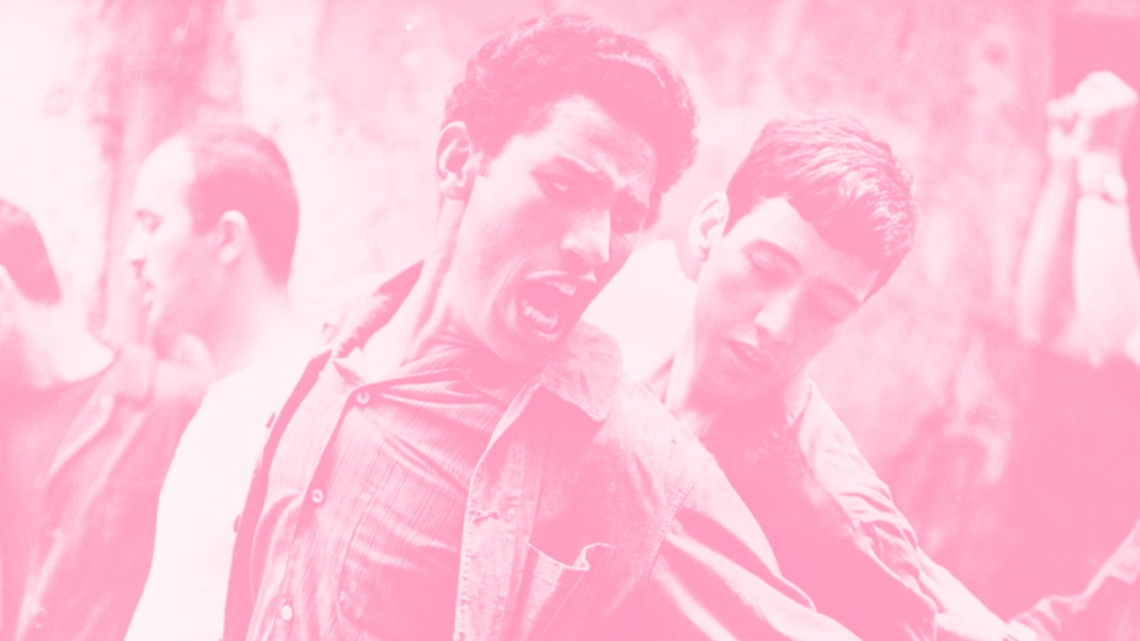I’ve always believed that cinema is not just meant to be watched but to be discussed. Since starting this podcast, Celebrating Cinema, for me at least, has been a space where we try to understand the films we watch through conversations – not by what people tell us to think.
These last weeks, I’m sure we have all been shaken to our core by the horrors & atrocities happening in Palestine & Israel. From our privileged position, we’ve watched this all unfold through our screens. In some ways it feels too profound to say but humanity really has been changed. Not necessarily just by the horrific terrorist attacks of Hamas on October 7th and the ongoing catastrophic genocide of the Palestinian people, but also our collective failing to take action before it was too late.
Haunted by a fear of history repeating itself, I’ve turned to cinema. Not for comfort but for answers. Maybe even hope. I return to Italian director Gillo Pontecorvo and his seminal film The Battle of Algiers. For those who may not have seen it, George Bass from the BFI summarises it as a film that dissects the anticolonial struggle into its key ingredients: public oppression, organised resistance and moments of incendiary violence that even Fox News wouldn’t show you – everything from bombed cafes to blowtorched ribs to child soldiers being beaten by mobs. Inspired by the memoirs of Algeria’s National Liberation Front (FLN) leader Saadi Yacef (who appears in the film playing a rebel commander).
Made in 1966, this an emotionally devastating account of the anti-colonial struggle of the Algerian people and a brutally candid exposé of the French colonial mindset. Both do horrendous things when they are in battle. Ultimately, it is the everyday people who are punished by brutal atrocities. Shot in a newsreel style: this fictional documentary rooted in Italian neorealism evokes a very visceral feeling every time we witness violence, regardless of which side.
On the face of it, Battle of Algiers might inspire other liberation movements for the oppressed, which it did of course. Supposedly the tactics of urban guerrilla warfare and terrorism in the movie were copied by the Black Panthers, the Provisional Irish Republican Army and the Palestinian Liberation Organization.
It may also be seen as a film for the oppressor to understand how to supposedly win this battle. The US Defence Department in fact screened this film in 2003 to study the tactics used by the French Army which they would adopt for their own illegal occupation of Iraq.
But both sides miss the point of the film entirely. About halfway through the film, we reach a poignant moment where a top FLN leader Larbi Ben M’hidi, confesses to Ali La Pointe, another rebel fighter that “Acts of violence don’t win wars.” “It’s the people themselves who must act”. Just like Larbi Ben M’hidi mentions, it’s not the violence & brutality that sticks with me from watching this but the people. After everything they’ve endured, the violence, oppression & murders, it is the Algerian people we see who take to the streets. Defiant & notably peaceful unlike the FLN in their efforts, their cries for freedom ring louder than ever. It’s the only thing we hear. No music, no dialogue just this.
It is this united collective action that produces one of the most moving endings for me in cinema I’ve seen. I couldn’t help but cry when I first watched this. Why? In that moment I really connected to these people, it’s a very human feeling after all to wish for nothing but your freedom & peace.
Made with all but one professional actor, and collaborating with former FLN fighters & local Algerian people. Battle of Algiers really is a film for the people, by the people. Pontecorvo manages to achieve a certain objectivity to this subject, despite his own personal politics. Making it undeniable for anyone to watch.
For me, cinema itself can be one of the greatest forms of protest, not just by documenting but by the stories & feelings it creates – it is people together taking action that can inspire others to take their own action in whatever way they can. Stanley Kubrick once said you cannot really understand what cinema is capable of without seeing The Battle of Algiers.
The victory at the end of Battle of Algiers is a victory of the masses, embodied by defiant Algerian women, whose gaze outwards to the future closes the film. When the violence eventually stops, I hope like the people of Algiers we continue to return to the streets to fight for the freedom & peace of us all. Starting with the freedom of Palestine. And I hope cinema continues to inspire us to do so. Because it is the people who win in the end.

